Related Research Articles

The Fantasy Trip (TFT) is a fantasy tabletop role-playing game designed by Steve Jackson and published in segments by Metagaming Concepts starting in 1977 and culminating in 1980. In 2019, Steve Jackson Games republished it as The Fantasy Trip Legacy Edition.

Kill Doctor Lucky is a humorous board game designed by James Ernest and released in 1996 by Cheapass Games. In 1998, Kill Doctor Lucky won the Origins Award for Best Abstract Board Game of 1997.

Up Front is a World War II card-based wargame. It was designed by Courtney F. Allen and published by Avalon Hill in 1983. Hasbro now owns the franchise, and at one time licensed it to Multi-Man Publishing, a license that has since expired without republication of the game. There was an attempt to reprint Up Front through Kickstarter in 2013. The project raised over $300,000, but no updates to status has been posted since March 21, 2014.

Cosmic Encounter is a science fiction–themed strategy board game designed by "Future Pastimes" and originally published by Eon Games in 1977. In it, each player takes the role of a particular alien species, each with a unique power to bend or break one of the rules of the game, trying to establish control over the universe. The game was inducted into the Academy of Adventure Gaming Arts & Design Adventure Gaming Hall of Fame in 1997.
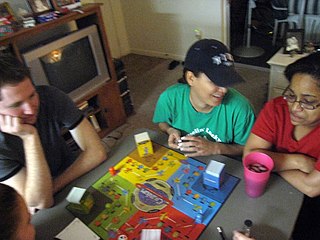
Cranium is a party game created by Whit Alexander and Richard Tait in 1998. Initially, Cranium was sold through Amazon.com and the Starbucks coffee chain, then-novel methods of distribution. After selling 44 million copies of Cranium and its sister titles, the game's manufacturer Cranium, Inc. was bought by Hasbro, Inc. for $77.5 million in 2008. Billed as "The Game for Your Whole Brain", Cranium includes a wide variety of activities, unlike many other party games. Murray Brand Commuications and brand strategist, Sonali Shah handled packaging and branding for the game, and the artwork is by cartoonist Gary Baseman.

7th Sea is an out-of-print collectible card game (CCG) first designed by Dan Verssen and published by Alderac Entertainment Group (AEG) from 1999 to 2002.
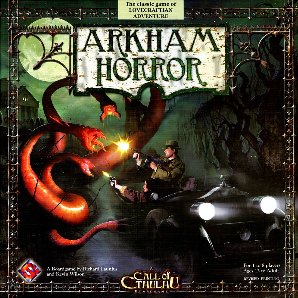
Arkham Horror is a cooperative adventure board game designed by Richard Launius, originally published in 1987 by Chaosium. The game is based on Chaosium's roleplaying game Call of Cthulhu, which is set in the Cthulhu Mythos of H. P. Lovecraft and other horror writers. The game's second edition was released by Fantasy Flight Games in 2005, with a third edition in 2018.

Empire Builder is a railroad board game originally published by Mayfair Games in 1982 that underwent several editions and eventually branched out into international and fantastical locations.
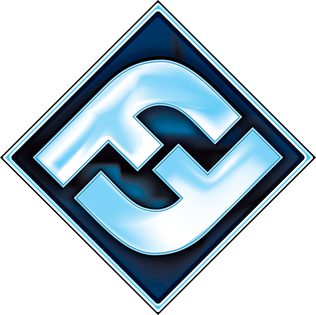
Fantasy Flight Games (FFG) is a game developer based in Roseville, Minnesota, United States, that creates and publishes role-playing, board, card, and dice games. As of 2014, it is a division of Asmodee North America.

Twilight Struggle: The Cold War, 1945–1989 is a board game for two players, published by GMT Games in 2005. Players are the United States and Soviet Union contesting each other's influence on the world map by using cards that correspond to historical events. The first game designed by Ananda Gupta and Jason Matthews, they intended it to be a quick-playing alternative to more complex card-driven wargames.
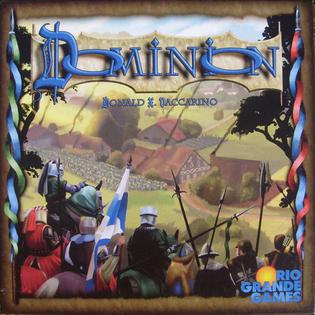
Dominion is a card game created by Donald X. Vaccarino and published by Rio Grande Games. Originally published in 2008, it was the first deck-building game, and inspired a genre of games building on its central mechanic.
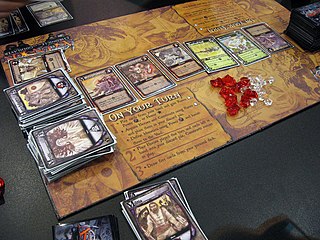
Ascension: Deckbuilding Game is a 2010 deck-building card game created by American studio Stone Blade Entertainment, headed by professional Magic: The Gathering player Justin Gary. The main designers of the game are Justin Gary, Brian Kibler, Rob Dougherty and John Fiorillo. The game is available both in physical and digital formats; the iOS version, developed by Playdek, was released on June 30, 2011, and was later released for Windows on December 16, 2014. Ascension Tactics, a spin-off with similar mechanics, was funded on Kickstarter in August 2020.
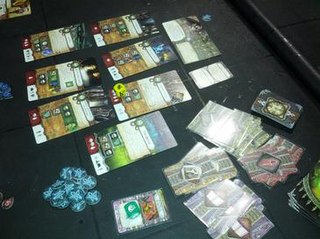
Elder Sign is a cooperative card and dice game, based on the Cthulhu Mythos of horror writer H.P. Lovecraft and Chaosium's Call of Cthulhu roleplaying game. It is published by Fantasy Flight Games, which also produces the Cthulhu Mythos games Arkham Horror, Call of Cthulhu: The Card Game, Mansions of Madness, and Eldritch Horror.
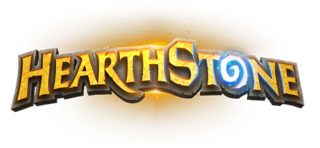
Hearthstone is a 2014 online digital collectible card video game produced by Blizzard Entertainment, released under the free-to-play model. Originally subtitled Heroes of Warcraft, Hearthstone builds upon the existing lore of the Warcraft series by using the same elements, characters, and relics. The game is available on the Windows, macOS, iOS and Android platforms, featuring cross-platform play. It has been a critical and commercial success, with Blizzard reporting more than 100 million Hearthstone players as of November 2018, and the game has become popular as an esport, with cash prize tournaments hosted by Blizzard and other organizers.

The Lord of the Rings: The Card Game is a card game produced by Fantasy Flight Games since 2011. As part of the Living Card Game (LCG) genre, it is a cooperative and strategic card game set in Middle-earth, a fantasy world featured in literary works by J. R. R. Tolkien, including The Hobbit and The Lord of the Rings.

Exploding Kittens is a casual dedicated deck card game designed by Matthew Inman of The Oatmeal webcomic, Elan Lee and Shane Small, and first published by The Oatmeal in 2015. Beginning as a Kickstarter project seeking US$10,000 in crowdfunding, it exceeded its goal in eight minutes.

Hand of Fate is an action role-playing roguelike deck-building game developed and published by Australian studio Defiant Development for Linux, macOS, Microsoft Windows, PlayStation 4, and Xbox One, released via early access on 7 July 2014, and then in the full release on 17 February 2015. A PlayStation Vita version was announced but ultimately cancelled due to development issues.

Kingdom Death: Monster is a cooperative board game created by Adam Poots and released in 2015.

Hearthstone is a digital collectible card game released by Blizzard Entertainment in 2014, available for Microsoft Windows and macOS PCs and iOS and Android smartphones. The game is free-to-play, with players gaining in-game currency and card packs via winning matches and completing quests, while real-world money can be spent to acquire additional card packs and cosmetic items. The game has been critically well-received and financially successful, estimated in August 2017 to earn nearly US$40 million per month. As of November 2018, Blizzard has reported more than 100 million Hearthstone players. Blizzard has continued to expand the game with the addition of multiple expansions, adventures and game modes.

Cartographers is a roll and write board game designed by Jordy Adan and published in 2019 by Thunderworks Games. It is part of the Roll Player universe. In the game, players aim to draw terrains based on drawn cards that award points based on the relevant letter cards. The game received positive reviews, and was nominated for the Kennerspiel des Jahres, but lost to The Crew. It was also runner-up to Parks for the Best Family Game of the 2019 Board Game Quests Awards. An app for solitary play was released in 2020.
References
- 1 2 3 4 Zimmerman, Aaron (2017-10-07). "The 7th Continent review: A board game unlike anything you've ever played". Ars Technica. Retrieved 2021-02-26.
- 1 2 3 "Review: The 7th Continent". iSlaytheDragon. 2019-09-11. Retrieved 2021-02-26.
- 1 2 3 4 5 6 7 Alex, Ronny; er (2017-12-05). "The 7th Continent Review". Co-op Board Games. Retrieved 2021-02-26.
- 1 2 "7th Continent Review - The "Tales from the Crypt" of Boardgames". Brawling Brothers Boardgaming Podcast. 2017-09-29. Retrieved 2021-02-26.
- 1 2 Miller, Matt. "Top Of The Table – The 7th Continent". Game Informer. Archived from the original on October 9, 2017. Retrieved 2021-02-26.
- ↑ "Table for One Kickstarter Alert: '7th Continent'". GeekDad. 2015-10-16. Retrieved 2021-02-26.
- ↑ Says, Twisti (2017-10-13). "16+ Hour Board Game Raises Over $5 Million On Kickstarter". Kotaku Australia. Archived from the original on October 17, 2017. Retrieved 2021-02-26.
- 1 2 3 4 5 6 "Presentation - The game - The 7th Continent - Serious Poulp". the7thcontinent.seriouspoulp.com. Retrieved 2021-06-17.